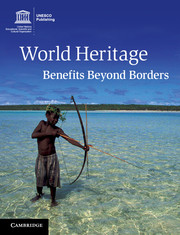Book contents
- Frontmatter
- Contents
- Foreword
- List of Acronyms
- Introduction
- Section 1 Bridging Nature and Culture
- Section 2 Urbanism and Sustainable Heritage Development
- Section 3 Integrated Planning and Indigenous Engagement
- Section 4 Living Heritage and Safeguarding Outstanding Universal Value
- Section 5 More than the Monumental
- Bibliography
- List of Contributors
- Photo Credits
- Index
Section 1 - Bridging Nature and Culture
Published online by Cambridge University Press: 05 December 2012
- Frontmatter
- Contents
- Foreword
- List of Acronyms
- Introduction
- Section 1 Bridging Nature and Culture
- Section 2 Urbanism and Sustainable Heritage Development
- Section 3 Integrated Planning and Indigenous Engagement
- Section 4 Living Heritage and Safeguarding Outstanding Universal Value
- Section 5 More than the Monumental
- Bibliography
- List of Contributors
- Photo Credits
- Index
Summary
The past four decades have witnessed a paradigm shift in the way the gulf between nature and culture has been bridged by managers and local communities in the conservation of World Heritage sites. In fact, the World Heritage Convention itself is the fundamental unifying framework for natural and cultural heritage conservation and this was further underscored by the World Heritage Committee, which adopted, in 2005, a unified set of World Heritage criteria following a first expert meeting on the subject in 1998. In according the respect due to global cultural diversity and different world views, the stakeholders have come to develop and practise a holistic ethic of conservation in bringing together people and their heritage across the binary of nature / culture divide. The range of case studies in this chapter illustrates this transformation. The local knowledge systems and communities practising heritage conservation on the ground have historically dealt with both nature and culture, often taking a systems approach, and they continue to do so.
Djoudj National Bird Sanctuary (Senegal), in particular, has witnessed the implementation of new mechanisms that put local communities and their integrated knowledge of nature and culture at the centre of government conservation priorities and concerns.
The overall economic value of the Great Barrier Reef (Australia) and its adjoining catchment area has been estimated to exceed AU$5.4 billion per annum and generates some 66,000 jobs, mostly in tourism. Over 220 Traditional Owners have undertaken compliance training, which has led to greater knowledge and awareness of marine compliance issues and, importantly, an increased feeling of empowerment by Traditional Owners managing sea country.
- Type
- Chapter
- Information
- World HeritageBenefits Beyond Borders, pp. 4 - 6Publisher: Cambridge University PressPrint publication year: 2012



